Smoking and dental practices are often at odds with each other. But today we are not discussing the dangers of nicotine, but about the first swelling after tooth manipulation. Can I smoke immediately after tooth extraction? How long does it take to smoke without fear of harming yourself? What are the dangers of smoking after tooth extraction? You will find the answers to these questions in the article.
TREATMENT STEPS
After tooth extraction, the open bleeding wound remains in place. If the wisdom tooth is removed, a large wound remains in place. To stop the bleeding, the dentist covers the wound with a cotton swab soaked in a medical solution, which should be removed after 20 minutes. After removing the hair, small blood clots form in the missing tooth cavity, which cannot be removed. These clumps are a guarantee of bone tissue regeneration and promote rapid wound healing.
Do not try to remove blood clots from the well: it is necessary for rapid tissue regeneration.
The dentist will treat the hole with a healing compound, and after removing the wisdom tooth, must take antibiotics. But antibiotics are prescribed not in all cases, but if the molars with curved roots or too much are operated on.
Once a large wound surface is formed, sutures can be used. In this case, the first puff can be done only 2 or 7 days after this procedure. It all depends on the tissue's ability to recover. Within a specified period, the suture will heal, and the doctor will release the surgical thread.
NICOTINE EFFECTS
Everyone has heard of the effects of nicotine drop on horse life, but they still smoke. How does addiction affect dental and oral health? It turns out that nicotine causes great danger to the mucous membranes, larynx, lungs. Nicotine irritates the mucous membranes, provokes various diseases of the oral cavity, and induces tooth decay.
Cigarette smoke contains a complex combination of various resins and chemicals that will interfere with tissue healing. The condition is complicated by the penetration of the listed substances into the blood through saliva. During inhalation, many toxic substances enter the human body, including hydrogen cyanide and hydrocyanic acid.
Nicotine and cigarette smoke are toxic to oral tissues. Smoking is only allowed after complete recovery of the injured mucosa.
Nicotine may have a mild pain relieving effect, relieving tension by stimulating the production of happiness hormones. However, the bad in the body is more than just the good. This should not be forgotten when justifying your habits with analgesic effects.
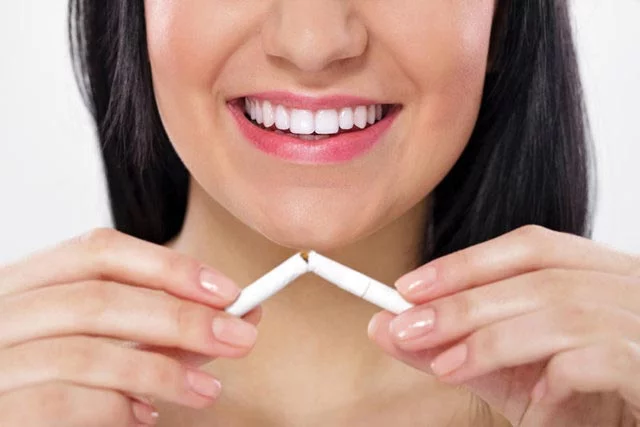
Negative effects of smoking after tooth extraction:
- development of inflammatory processes in the tissues of the oral cavity;
- development of inflammatory processes in the hole - alveolitis;
- increased blood pressure, blood clots.
Claims of the beneficial effects of nicotine on stress suppression are not supported by scientific experiments. In fact, cigarette smoke gives rise to the illusion of stress relief, and even exacerbates negative manifestations at the physiological level:
- tachycardia;
- angina pectoris;
- increased respiration;
- peristalsis function violation;
- muscle tension.
Therefore, after removing the molars, you should refrain from smoking for as long as possible, preferably for a few days. Carcinogens contained in tobacco smoke are stored layer by layer on the wound surface, causing great health hazards.
ALVEOLITH
The first danger of smoking cigarettes after surgery: nicotine dries well. For tissue regeneration to occur in a timely and successful manner, a humid environment is required. However, cigarette smoke contributes to the drying of the mucous membrane, which has a negative effect on the surface of the hole.
Dry holes are a testing ground for the activity of pathogenic bacteria that quickly provoke the inflammatory process. In severe cases, the inflammatory process will end in alveolitis, a serious illness. With this pathology, the wall of the hole, which is formed after molar removal, becomes inflamed.
Causes of alveolitis:
- violation of tissue integrity due to injury;
- infection on fresh wounds;
- violation of blood clotting dynamics.
Symptoms resemble body intoxication with pathogenic bacterial waste products:
- muscle pain;
- headache;
- nausea and weakness.
In addition to the symptoms of general intoxication, pathological features of gingival tissue appear: edema of the mucous membranes, edema of the facial muscles from the focus of inflammation. Osteomyelitis with the formation of fistulous ducts of persistent pus outflow can be a complication of alveolitis.
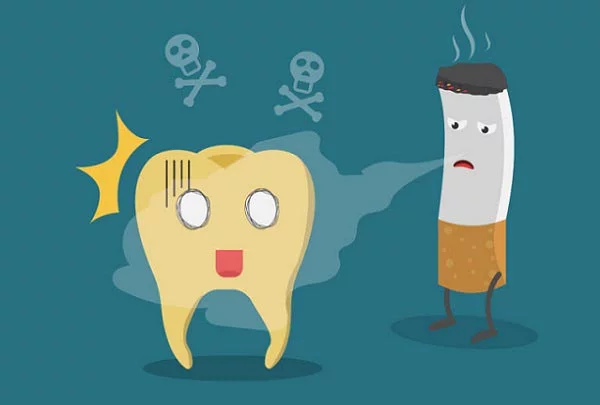
BLOOD PRESSURE
A smoking cigarette will temporarily raise blood pressure, which can cause the blood clot that covers the socket to simply "come out". This threatens the development of inflammatory processes due to infection in open wounds. The chemicals in cigarette smoke block the lumen of blood vessels, thus increasing blood pressure. Vasoconstriction inhibits adequate mucosal tissue nutrition, which slows down the regrowth process.
HOISTANA MEROKOK, VIPING
It is believed that hookah is less harmful to smokers due to the use of fine tobacco. Is that so? Purified tobacco smoke causes less damage to health, but has the same negative effect on the surface of the wound. It settles on the mucous membranes, interferes with normal blood circulation and provokes the inflammatory process.
With regard to electronic analogs of cigarettes and hookah - wipes - the ban also applies. Resins are not released during the wiping process, but other toxic substances are formed. They penetrate the surface of mucus and wounds, endangering the smoker.
Wipe composition:
- diasetil;
- glycerin;
- propylene glycol;
- perisa.
Diacetyl aromatizer poses a certain danger, which becomes toxic when heated in a cigarette battery. In moderate amounts, this substance is not harmful to health, but if heated and drunk continuously, it can cause serious pathology in the lungs.
Inhalation of smoke causes the mucous membranes of the mouth to dry out, paving the way for the growth and harmful action of pathogenic bacteria.
Propylene glycol provokes allergies, accumulated in mucous membrane tissue. This substance irritates the mucous membranes, causing inflammation and other pathologies. At high temperatures, glycerin and propylene glycol form formaldehyde and acrolein, which are harmful.
The use of one wipe by some smokers provokes the spread of infectious diseases, hepatitis, tuberculosis. The same can be said of hookah if different people use the same pipe.
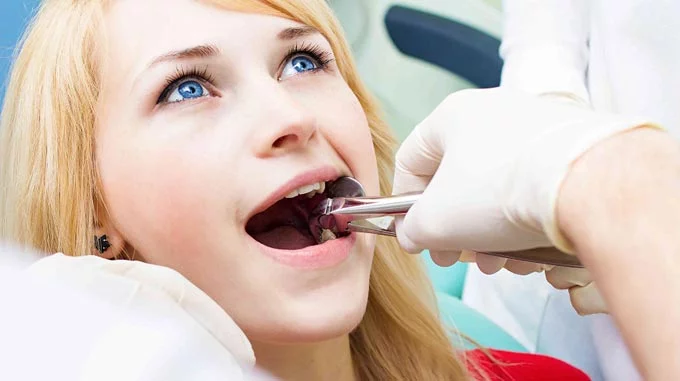
TEETH PROPOSAL
If there are no specific problems with non-smoking patients, then many dental and orthodontic procedures are not available for smokers. Smokers should not perform surgery to replenish jaw bone tissue, suture soft tissue, or implant implants. During tightening, the seams may slip and the implant may fall off. But, by following the precautions and following the recommendations of the dentist, you can achieve results for smokers.
DOCTOR'S ADVICE
- Wipe cotton with antiseptic can be removed 20 minutes after tooth resection, if this is not done, bacteria will start to multiply;
- The blood ball in the tooth socket cannot be spit on or removed in any other way - it protects the wound from adverse external environment, activates tissue regrowth;
- rinse your mouth with antiseptic carefully so as not to accidentally remove the protective ball from the well;
- it is better to replace the common mouthwash with a solution with a tray - keep the solution in the mouth, and then spit it out carefully;
- if a doctor puts medicine in a well, it cannot be removed without permission;
- first oral hygiene can only be done the next day after surgery;
- if the doctor has prescribed antibiotics, it must be followed;
- in case of severe pain, it is recommended to take anesthesia, you should not experience any discomfort in the gums.
If the removal operation is successful, the first puff can be made after a few hours. Turn your attention away from thinking about smoking for at least 2 hours.
If the bleeding does not stop after 2 hours, you can not think of a cigarette. Strong swelling can increase bleeding, so you should seek additional medical help.
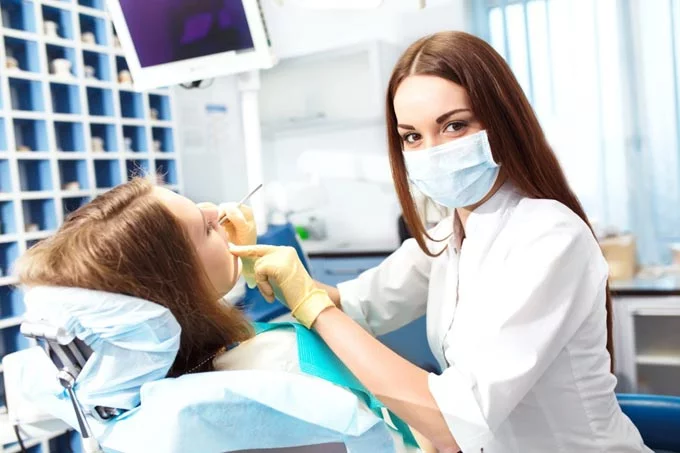
WHAT IS PROHIBITED
- Clean, rinse mouth 24 hours after resection;
- steam baths, hot water baths, sunbathing in the solarium - increasing degrees will increase bleeding from wounds;
- to work out at the fitness club, gym, sports section - until the wound heals and the stitches dissolve;
- when stitches are used, you can not only tighten, but also smile and open your mouth wide - the stitches will spread quickly;
- you can enjoy snacks after being depressed only after 2-3 hours, you are also not encouraged to drink fluids (or with caution through a straw);
- alcohol is strictly forbidden - it is very thin blood, the wound will start to bleed;
- today you can not drive a car, it is better to call a taxi.
For a while, you should skip spicy, salty foods, very hot / cold dishes. This means you should not eat ice cream, drink cold fruit drinks or freshly brewed coffee. Pickled mushrooms and pickles are also temporarily banned, it is recommended to stop smoked meats.
You should also give up coarse foods: croutons, hard fruits, vegetables. You should not gnaw on carrots and carrots for several days in a row. Food products must be soft, not overcooked, and not spicy. You should go on a frugal diet for a few days until the tissue is completely healed.
WHAT YOU NEED TO DO
- Apply ice to the cheeks if the pain subsides - but keep such compresses for no more than ten minutes;
- warm herbal bath - it will relieve damaged tissue, relieve swelling, relieve pain;
- take painkillers, anti-inflammatory drugs, except aspirin and analgin - they thin the blood.
If you are undergoing medical treatment, you must inform your dentist. He will adjust his medication intake. Some drugs affect the viscosity of the blood and cause bleeding, so its use should be discontinued.
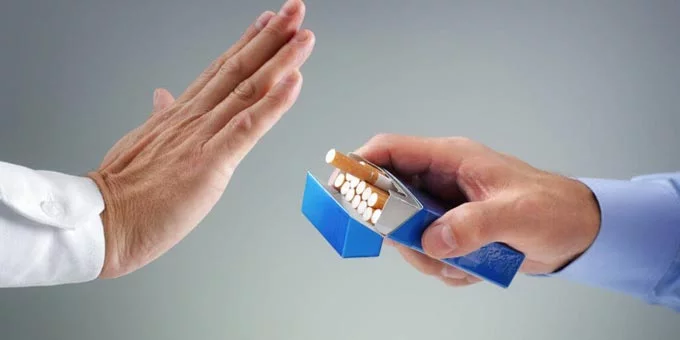
TOTAL
Cigarette smoke provokes the development of various pathological conditions that prevent the rapid healing of damaged tissue. Therefore, it is impossible to linger after removing the molars for several hours, and during sewing the gums - a few days. Smoke contains many toxic substances that get into damaged shells and cause harm.
Also, tobacco smoke dries out the mucous membranes, which pose a danger to blood balls in wells - it is responsible for restoring tissue integrity, preventing microbial penetration.























